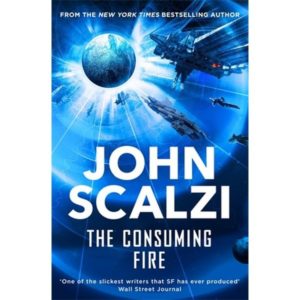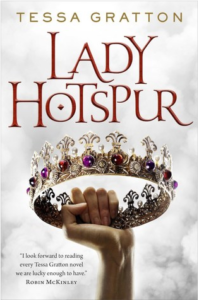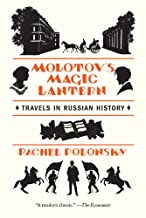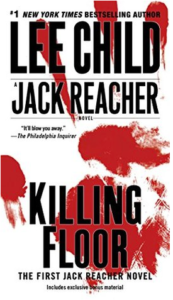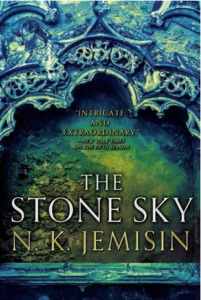Another busy year in reading, with my book total clocking in at 189 books, up four from last year, with an almost 3000 page increase (with a big ole thanks to Goodreads once again for crunching my numbers. Full list can be found here! Feel free to friend me while you’re there.) This uptick was largely due to work ramping up greatly over at CriminalElement.com, the other website I write for, an employment which makes it possible for me to read and read greedily without financially bankrupting myself in the process.
As with last year, I had very strong feelings about quite a number of the books I read, so here’s my Top 10 list of books I read last year. This time, however, I’ll include the pub date so you can get a better idea of how timely/topical my choices are. Presented in the order I read them:
1. Hero At The Fall by Alwyn Hamilton (2018) — I still can’t believe how well this three book series moved from an uneven, if inspired, first entry to this absolutely terrific ending, that meditated with heartbreaking clarity on the legacies we leave and the power of storytelling. I almost hate it for bolstering my belief in not cutting my losses if the first book in a series doesn’t stun me. This was one of the best fantasy series I’ve ever enjoyed, set in an alternate world where our heroes fight for the fate of Miraji, a stand-in for the Middle East. Given recent world events, it fills me with sorrow that promoting beautiful books like this can feel like shouting into a hurricane, but the messages of freedom and anti-colonialism (especially coming from a British author!) are worthy of repeating again and again.
2. The Dead Queen’s Club by Hannah Capin (2019) — I have a long obsession with retellings and let me tell you, they are hard to do right. Sometimes agendas are too obvious, sometimes the massaging of facts to fit the story the author wants to tell just feels too far-fetched, and sometimes the story being told just feels too distant from the original. But if you want to read a masterclass in making a chapter of history feel relevant to modern concerns, as well as a redemptive tale of a beleaguered historical figure whose only literary champion prior to this remade her entirely in the image of a different queen, then look no further than Hannah Capin setting the story of Henry VIII and his six wives in a 21st century Indiana high school. She’s also got an updating of Macbeth in high school coming soon: I have a review copy and am dyyyyyying that I haven’t been able to get it yet.
3. My Lovely Wife by Samantha Downing (2019) — What if a married pair of serial killers had children, and slowly came to realize that their extracurricular activities might be harming the family they’ve worked so hard to build? Thrilling and thoughtful by turns, with an ending I did not see coming, this was definitely my favorite domestic thriller of the year.
4. The Weight Of Our Sky by Hanna Alkaf (2019) — I might be predisposed to like this novel because I, like the author, am Malaysian myself, but I did not expect it to be such an absorbing, harrowing journey through a difficult piece of history, seen through the vividly lived-in experience of a young girl with obsessive compulsive disorder. It is not a book for the faint of heart, but it is so very worthwhile.
5. The Kingdom Of Copper by S. A. Chakraborty (2019) — The follow up to one of my best books of 2018 only built on the strengths of its predecessor to tell a swashbuckling tale of politics and intrigue, based on Islamic mythology. I don’t stan for a lot of authors, but I hearts and flowers S. A. Chakraborty so hard.
6. Wastelands: The New Apocalypse edited by John Joseph Adams (2019) — Reading this anthology was a delightful throwback to my younger days spent devouring compilations curated by Gardner Dozois or Ellen Datlow and Terri Windling. Filled with quality short fiction, this collection belies its seemingly grim subject matter with tales of hope and fortitude in the face of the end of it all. It’s the kind of anthology perfect for when you can’t invest the time in one long narrative but still want to enjoy the best that the genre has to offer. Superlative.
7. The Warehouse by Rob Hart (2019) — A clever near-future extrapolation of late stage capitalism and its effects on American society, this is a cautionary tale that I’m still thinking about as the new year begins. I still hope Zinnia is okay.
8. Always North by Vicki Jarrett (2019) — This year’s Annihilation for me, a novel that only grows lovelier in the remembering. Written with stylistic boldness, it meditates on a society rapidly deteriorating in the face of climate change.
9. Fireborne by Rosaria Munda (2019) — This fantasy novel boldly struck out into new philosophical territory, starting from the rebuilding of a nation rent by revolution, with two teenaged protagonists from wildly different backgrounds with equally heartbreaking yet diverse experiences of trauma. I genuinely do not understand why I haven’t read more hype about this brilliant, lyrical book.
10. The Kiss Quotient by Helen Hoang (2018) — I consciously tried to better at reading romance novels this year, and was rewarded with this absolute gem of a novel. Possibly the best romance novel I’ve ever read.
Honorable mentions go to Oyinkan Braithwaite’s My Sister, The Serial Killer (2017) and Sara Faring’s genre-bending The Tenth Girl (2019). I’m a little surprised that no “serious fiction” made my list but there’s so much wonderful reading in this world to do: why search for meaning only in the obvious places?
On the non-fiction side, shoutouts go to my favorite cookbook of the year, Chelsea Monroe-Cassel’s Firefly — The Big Damn Cookbook (2019). One of my favorite publishers — First Second Books, usually known for their children’s graphic novels — also swung for the fences with the terrific Open Borders by Bryan Caplan and Zach Weinersmith (2019). And if you’re good and ready to enact political change, then I can’t recommend Lauren Duca’s How To Start A Revolution highly enough.
Here’s to a 2020 of more great reads! If you’re interested in keeping up with my reading visually (as well as general photos of what I’m up to,) I’m also on Instagram as dvalerisactual. I only catalog hard copies there, alas: Kindle versions just don’t have the same aesthetic appeal.

